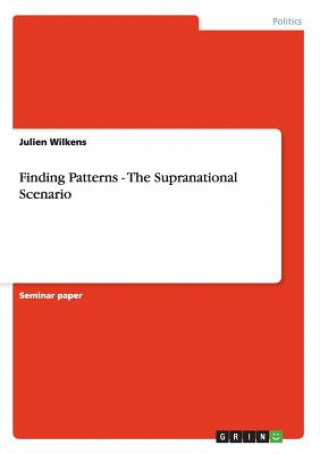
Kód: 01611746
Finding Patterns - The Supranational Scenario
Autor Julien Wilkens
Seminar paper from the year 2007 in the subject Politics - International Politics - Topic: European Union, printed single-sided, grade: 1,7, University of Mannheim, 10 entries in the bibliography, language: English, abstract: When ... celý popis
- Jazyk:
 Angličtina
Angličtina - Väzba: Brožovaná
- Počet strán: 40
Nakladateľ: Grin Publishing, 2008
- Viac informácií o knihe

Mohlo by sa vám tiež páčiť
-
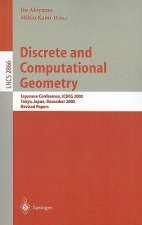
Discrete and Computational Geometry
68.77 € -

Treasury of Heroes and Heroines A Record of High Endeavour and Strange Adventure from 500 B.C. to 1920 A.D.
46.15 € -

Cognition and Intelligence
58.01 € -

First Part of the Royal Commentaries of the Yncas
58.82 € -

Gladys Aylward
11.05 € -

Authentic Designs from the American Arts and Crafts Movement
20.10 € -

Schoßgebete
11.96 €
Darujte túto knihu ešte dnes
- Objednajte knihu a vyberte Zaslať ako darček.
- Obratom obdržíte darovací poukaz na knihu, ktorý môžete ihneď odovzdať obdarovanému.
- Knihu zašleme na adresu obdarovaného, o nič sa nestaráte.
Viac informácií o knihe Finding Patterns - The Supranational Scenario
Nákupom získate 120 bodov
 Anotácia knihy
Anotácia knihy
Seminar paper from the year 2007 in the subject Politics - International Politics - Topic: European Union, printed single-sided, grade: 1,7, University of Mannheim, 10 entries in the bibliography, language: English, abstract: When studying the European Union, one will find references to the supranational scenario quite soon. In current literature, there is a trend to think about an integration dimension in the European Union. According to this idea, the Status Quo is located at one end of the integration continua, the supranational actors, that is, the Commission and the European Parliament, at the other one. The Status Quo is assumed to be formed under the Luxemburg Compromise and therefore to be at the point of the least integrationist member state. Contrary to this, the Commission and the European Parliament are more pro-integrationist than all member states of the Council of Ministers. One of the most well-know theorists in the analysis on European Union in an institutionalist way is George Tsebelis. My research question will be: Is there empirical evidence that one can easily assume that the European Parliament and the Commission are (a) located closely together in their preferences for concrete policies? Are (b) these positions generally opposite from the Status Quo? And are there (c) some factors which influence the likelihood that EP and EC will be positioned more closely together and at the same time far away from the Status Quo? Does (d) the supranational scenario influence the outcome?The quantitative check of Tsebelis assumption will be made with the Decision-Making in the European Union Dataset. This database includes the position, the salience and the power of all (for the moment) 15 members of the Council, the outcome after the bargaining process, the reference point, and the two relevant actors in my study: the European Parliament and the Commission. To proceed, I will use the statistic program Stata 9.1, and run statistical tests on the data. The goal of this paper is to provide further insights into the positioning of the Parliament and the Commission and to see if the supranational scenario survives a quantitative analysis. As my goal is to find patterns, I will emphasize on an explorative study, without, however, undermining the principles of a social inquiry.
 Parametre knihy
Parametre knihy
Zaradenie knihy Knihy po anglicky Society & social sciences Politics & government
47.85 €
- Celý názov: Finding Patterns - The Supranational Scenario
- Autor: Julien Wilkens
- Jazyk:
 Angličtina
Angličtina - Väzba: Brožovaná
- Počet strán: 40
- EAN: 9783640114726
- ISBN: 3640114728
- ID: 01611746
- Nakladateľ: Grin Publishing
- Hmotnosť: 64 g
- Rozmery: 210 × 148 × 4 mm
- Dátum vydania: 30. July 2008
Obľúbené z iného súdka
-

Case Against the Sexual Revolution
16.28 € -23 % -

Wretched of the Earth
10.65 € -16 % -

The Trigger
23.92 € -14 % -

State and Revolution
5.22 € -13 % -

Accidental Superpower
18.09 € -19 % -

My Autobiography
13.56 € -15 % -

Fight Like A Girl
12.26 € -14 % -

Against Civilization
16.98 € -

Abaddon Ascending: The Ancient Conspiracy at the Center of CERN's Most Secretive Mission
28.05 € -

The Lords of Poverty: The Power, Prestige, and Corruption of the International Aid Business
14.37 € -15 % -
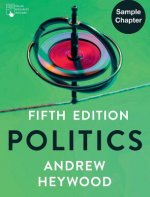
Politics
51.68 € -5 % -

Cold and the Dark
20.30 € -10 % -

Voices from the Contemporary Japanese Feminist Movement
57.61 € -
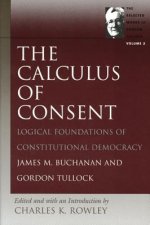
Calculus of Consent
17.08 € -

Mafia Monograph, Part 1 of 4
21.61 € -

Harm Reduction or Harm Maintenance
31.74 € -

Israel Lobby and U. S. Foreign Policy
38.50 € -

Entropy Of Capitalism
46.15 € -

Red Petrograd
20.10 € -

Troubled Constitutional Future
28.15 € -

Lineages of Modernity - A History of Humanity from the Stone Age to Homo Americanus
44.74 € -

City of Quartz
15.68 € -14 % -

Inventing Vietnam
40.61 € -10 % -

Flash Boys - A Wall Street Revolt
12.86 € -
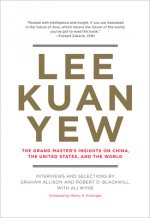
Lee Kuan Yew
19.60 € -10 % -

Giants
24.12 € -

Children of the Matrix
17.99 € -15 % -

Queer Encounters with Communist Power
22.01 € -5 % -

Identity
12.06 € -22 % -

Deep State
16.88 € -15 % -

Next Decade
17.89 € -20 % -

Return of Marco Polo's World
15.27 € -20 % -

Force of Reason
24.12 € -

STRANGE DEATH OF EUROPE
20.91 € -

Political Science For Dummies
18.69 € -30 % -

Yoga of Eating
12.76 € -14 % -

Political Brain
15.17 € -23 % -

GREEN BOOK
7.73 € -23 % -

Politics: A Very Short Introduction
9.95 € -22 % -

Out of the Wreckage
17.99 € -15 % -

No Turning Back
12.06 € -22 % -

Urban Warfare in the Twenty-First Century
26.94 € -4 % -

Trade Marketing, Category Management, and Shopper Marketing
91.70 € -

Spirit of the Laws
24.73 € -

USAF Military Working Dog Program - Scholar's Choice Edition
29.50 € -
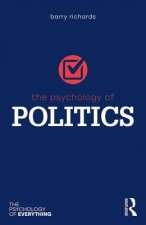
Psychology of Politics
23.22 € -

Report From Iron Mountain
15.58 € -

Lies My Teacher Told Me
23.52 € -15 % -

Liberalism and Its Critics
35.39 €
Osobný odber Bratislava a 2642 dalších
Copyright ©2008-24 najlacnejsie-knihy.sk Všetky práva vyhradenéSúkromieCookies



 21 miliónov titulov
21 miliónov titulov Vrátenie do mesiaca
Vrátenie do mesiaca 02/210 210 99 (8-15.30h)
02/210 210 99 (8-15.30h)